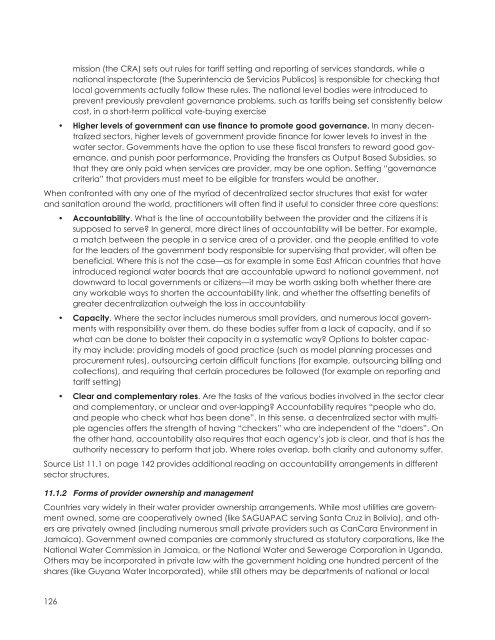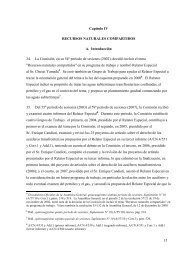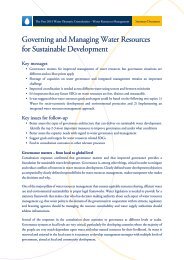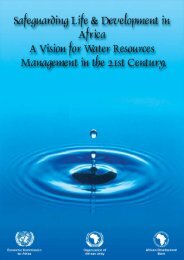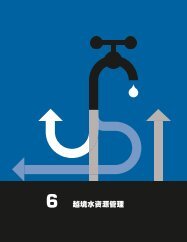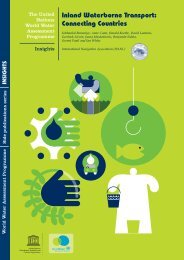A Sourcebook - UN-Water
A Sourcebook - UN-Water
A Sourcebook - UN-Water
You also want an ePaper? Increase the reach of your titles
YUMPU automatically turns print PDFs into web optimized ePapers that Google loves.
mission (the CRA) sets out rules for tariff setting and reporting of services standards, while a<br />
national inspectorate (the Superintencia de Servicios Publicos) is responsible for checking that<br />
local governments actually follow these rules. The national level bodies were introduced to<br />
prevent previously prevalent governance problems, such as tariffs being set consistently below<br />
cost, in a short-term political vote-buying exercise<br />
• H igher levels of government can use finance to promote good governance. In many decentralized<br />
sectors, higher levels of government provide finance for lower levels to invest in the<br />
water sector. Governments have the option to use these fiscal transfers to reward good governance,<br />
and punish poor performance. Providing the transfers as Output Based Subsidies, so<br />
that they are only paid when services are provider, may be one option. Setting “governance<br />
criteria” that providers must meet to be eligible for transfers would be another.<br />
When confronted with any one of the myriad of decentralized sector structures that exist for water<br />
and sanitation around the world, practitioners will often find it useful to consider three core questions:<br />
• A ccountability. What is the line of accountability between the provider and the citizens it is<br />
supposed to serve? In general, more direct lines of accountability will be better. For example,<br />
a match between the people in a service area of a provider, and the people entitled to vote<br />
for the leaders of the government body responsible for supervising that provider, will often be<br />
beneficial. Where this is not the case—as for example in some East African countries that have<br />
introduced regional water boards that are accountable upward to national government, not<br />
downward to local governments or citizens—it may be worth asking both whether there are<br />
any workable ways to shorten the accountability link, and whether the offsetting benefits of<br />
greater decentralization outweigh the loss in accountability<br />
• Capacity. Where the sector includes numerous small providers, and numerous local governments<br />
with responsibility over them, do these bodies suffer from a lack of capacity, and if so<br />
what can be done to bolster their capacity in a systematic way? Options to bolster capacity<br />
may include: providing models of good practice (such as model planning processes and<br />
procurement rules), outsourcing certain difficult functions (for example, outsourcing billing and<br />
collections), and requiring that certain procedures be followed (for example on reporting and<br />
tariff setting)<br />
• Clear and complementary roles. Are the tasks of the various bodies involved in the sector clear<br />
and complementary, or unclear and over-lapping? Accountability requires “people who do,<br />
and people who check what has been done”. In this sense, a decentralized sector with multiple<br />
agencies offers the strength of having “checkers” who are independent of the “doers”. On<br />
the other hand, accountability also requires that each agency’s job is clear, and that is has the<br />
authority necessary to perform that job. Where roles overlap, both clarity and autonomy suffer.<br />
Source List 11.1 on page 142 provides additional reading on accountability arrangements in different<br />
sector structures.<br />
11.1.2 Forms of provider ownership and management<br />
Countries vary widely in their water provider ownership arrangements. While most utilities are government<br />
owned, some are cooperatively owned (like SAGUAPAC serving Santa Cruz in Bolivia), and others<br />
are privately owned (including numerous small private providers such as CanCara Environment in<br />
Jamaica). Government owned companies are commonly structured as statutory corporations, like the<br />
National <strong>Water</strong> Commission in Jamaica, or the National <strong>Water</strong> and Sewerage Corporation in Uganda.<br />
Others may be incorporated in private law with the government holding one hundred percent of the<br />
shares (like Guyana <strong>Water</strong> Incorporated), while still others may be departments of national or local<br />
126


